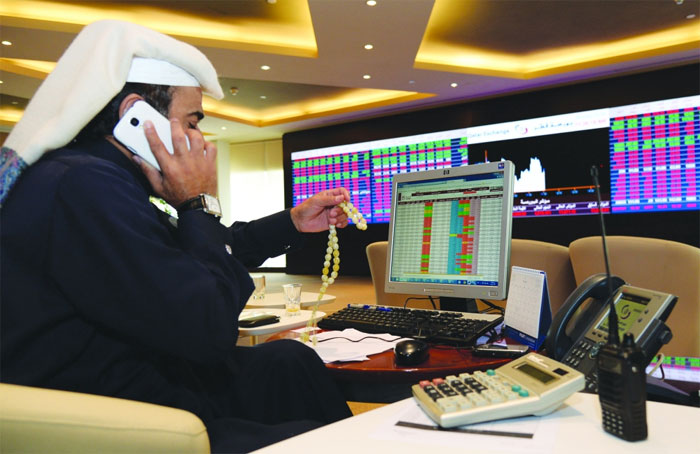By Santhosh V Perumal
Business Reporter
The Qatar Stock Exchange (QSE), which is awaiting final clearance from the regulator for the launch of exchange traded funds, outperformed the other Gulf bourses to settle above the 12,500 mark with attractive valuations turning foreign institutions strongly bullish.
Real estate and insurance equities were seen high in demand as the 20-stock Qatar Index gained about 2% during the week that saw Gulf Warehousing planning to raise as much as QR458mn from the secondary markets as part of strengthening its capital base to support the expansion.
Dubai and Kuwait bourses declined 0.75% and 0.63%; while Abu Dhabi gained 1.65%, Muscat (0.7%), Saudi Arabia (0.14%) and Bahrain (0.12%) during the week that saw global credit rating agency Moody's assign a first time long and short term local and foreign currency deposit ratings of ‘A3/Prime-2’ to Al Khaliji, which has a market share of 5% in terms of assets.
The market largely remained flat in the first two days, then to witness minor corrections to touch a low of 12,250 points on Tuesday but substantial gains in the last two days took the benchmark to 12,516 points at the end of the week.
Qatari bourse has so far (year-to-date) reported 1.87% gains against Saudi Arabia’s 16.78%, Dubai’s 7.91%, Abu Dhabi’s 2.23% and Muscat’s 0.29%; while Kuwait and Bahrain plunged 2.74% and 2.43% respectively.
The overall bullish path came amidst strong profit booking by local retail investors and domestic institutions during the week that saw Moody's upgrade QIIB's long term and short term issuer rating to 'A2/Prime-1' from 'A3/Prime-2' and also changed baseline credit assessment (BCA) and adj. BCA to 'baa3' from 'ba1'.
However, non-Qatari individual investors’ net selling weakened during the week that saw Qatar's cost of living, based on consumer price index, rise 0.9% year-on-year in April 2015.
The index that tracks Shariah-principled stocks was, however, seen gaining much slower than the other indices in the market during the week that saw Qatar Investment Fund say the country, a late but stable developer among hydrocarbon states, is expected to witness “super-normal” pace for the next 5-7 years on the back of “Chinese style” infrastructure upgrade but dollar strength could undermine the competitiveness of its non-oil economy.
The 20-stock Total Return Index rose 1.9%, All Share Index (comprising wider constituents) by 1.52% and Al Rayan Islamic Index 0.7 during the week that saw more than 53% of the companies extend gains to investors.
Realty stocks appreciated 10.02%, insurance (9.58%) and consumer goods (0.54%); while industrials fell 1.52%, telecom (1.51%), transport (0.8%) and banks and financial services (0.22%) during the week that saw insurance and realty segments witness higher volumes.
Of the 43 stocks, 23 gained, while 16 declined and four were unchanged during the week that saw trading volume was largely skewed towards real estate and banking shares.
Eight of the 12 banks and financial services, four each of the eight consumer goods and the nine industrials, three of the five insurers, two of the four realty and one each of the two telecom and the three transport equities closed higher during the week that saw gainers outnumber losers.
Major movers included Ezdan, Qatari Insurance, Doha Insurance, Vodafone Qatar, Qatar Islamic Bank, Doha Bank, Commercial Bank, Al Khaliji, Zad Holding and Qatari Investors Group.
However, Industries Qatar, Masraf Al Rayan, Ooredoo, Dlala, Qatar National Cement, Gulf International Services, United Development Company, Mazaya Qatar and Gulf Warehousing bucked the trend during the week.
Market capitalisation rose 0.84% or about QR6bn to QR666.09bn mainly on 2.82% expansion in mid cap equities; even as large, micro and small caps fell 0.8%, 0.14% and 0.08% respectively during the week.
Small, micro mid cap stocks have gained 10%, 7.97% and 6.11% respectively year-to-date; whereas large cap lost 5.92%.
Foreign institutions’ net buying considerably strengthened to QR365.06mn against QR16.7mn the previous week.
Non-Qatari retail investors’ net selling fell to QR26.68mn compared to QR30.95mn the week ended May 7.
However, domestic institutions turned net sellers to the tune of QR137.75mn against net buyers of QR54.11mn the previous week.
Local retail investors’ net profit booking considerably shot up to QR200.64mn compared to QR39.86mn the week ended May 7.
Total trade volume rose 47% to 75.96mn shares, value by 22% to QR2.72bn and transactions by 9% to 30,911 during the week.
The insurance sector’s trade volume almost quadrupled to 2.83mn equities and value grew more than six-fold to QR245.51mn on more than doubled deals to 1,403.
The real estate sector saw its trade volume more than double to 37.03mn stocks, value soared 62% to QR890.41mn and transactions by 52% to 8,484.
The banks and financial services sector reported 48% surge in trade volume to 18mn shares and 17% in value to QR866.79mn but on a 4% fall in deals to 8,723.
The industrials sector’s trade volume expanded 22% to 6.72mn equities, even as value fell 13% to QR375.72mn. Transactions rose 10% to 5,745.
However, the market witnessed 53% plunge in the transport sector’s trade volume to 1.14mn stocks, 53% in value to QR55.75mn and 46% in deals to 854.
The consumer goods sector’s trade volume plummeted 40% to 5.66mn shares, value by 23% to QR180.97mn and transactions by 31% to 3,048.
There was 15% shrinkage in the telecom sector’s trade volume to 4.58mn equities and 3% in value to QR107.17mn but on a 37% jump in deals to 2,654.
In the debt market, there was no trading of treasury bills and government bonds during the week.

